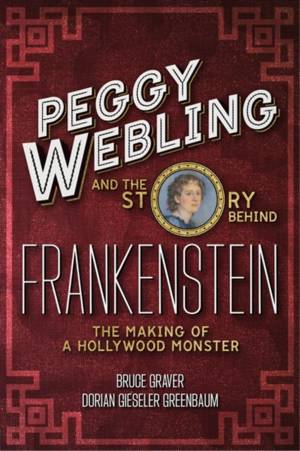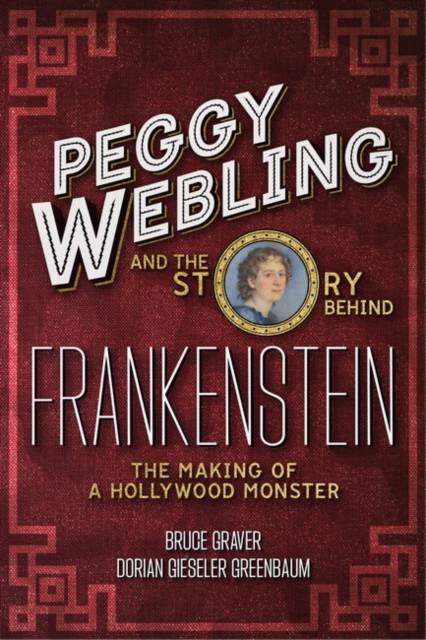
- Afhalen na 1 uur in een winkel met voorraad
- Gratis thuislevering in België vanaf € 30
- Ruim aanbod met 7 miljoen producten
- Afhalen na 1 uur in een winkel met voorraad
- Gratis thuislevering in België vanaf € 30
- Ruim aanbod met 7 miljoen producten
Peggy Webling and the Story behind Frankenstein
The Making of a Hollywood Monster
Peggy Webling, Dorian Gieseler Greenbaum, Bruce Graver
Hardcover | Engels
€ 161,45
+ 322 punten
Uitvoering
Omschrijving
The 1931 Universal Pictures film adaptation of Frankenstein directed by James Whale and starring Boris Karloff as the now iconic Monster claims in its credits to be 'Adapted from the play by Peggy Webling'.
Webling's play sought to humanize the creature, was the first stage adaptation to position Frankenstein and his creation as doppelgängers, and offered a feminist perspective on scientific efforts to create life without women, ideas that suffuse today's perceptions of Frankenstein's monster. The original play script exists in several different versions, only two of which have ever been consulted by scholars; no version has ever been published. Nor have scholars had access to Webling's private papers and correspondence, preserved in a family archive, so that the evolution of Frankensteinfrom book to stage to screen has never been fully charted.
In Peggy Webling and the Story behind Frankenstein, Dorian Gieseler Greenbaum (Webling's great grandniece) and Bruce Graver present the full texts of Webling's unpublished play for the first time. A vital critical edition, this book includes:
- the 1927 British Library Frankenstein script used for the first production of the play in Preston, Lancashire
- the 1928 Frankenstein script in the Library of Congress, used for productions in UK provincial theatres from autumn 1928 till 1930
- the 1930 Frankenstein Prompt Script for the London production and later provincial performances, held by the Westminster Archive, London
- Webling's private correspondence including negotiations with theatre managers and Universal Pictures, family letters about the writing and production process, and selected contracts
- Text of the chapter 'Frankenstein' from Webling's unpublished literary memoir, The Story of a Pen for additional context
- Biography of Webling that bears directly on the sensibilities and skills she brought to the writing of her play
- History of how the play came to be written and produced
- The relationship of Webling's play to earlier stage and film adaptations
- An exploration of playwright and screenwriter John L. Balderston's changes to Webling's play and Whale's borrowings from it in the 1931 film
Offering a new perspective on the genesis of the Frankensteinmovie, this critical exploration makes available a unique and necessary 'missing link' inthe novel's otherwise well-documented transmedia cultural history.
Webling's play sought to humanize the creature, was the first stage adaptation to position Frankenstein and his creation as doppelgängers, and offered a feminist perspective on scientific efforts to create life without women, ideas that suffuse today's perceptions of Frankenstein's monster. The original play script exists in several different versions, only two of which have ever been consulted by scholars; no version has ever been published. Nor have scholars had access to Webling's private papers and correspondence, preserved in a family archive, so that the evolution of Frankensteinfrom book to stage to screen has never been fully charted.
In Peggy Webling and the Story behind Frankenstein, Dorian Gieseler Greenbaum (Webling's great grandniece) and Bruce Graver present the full texts of Webling's unpublished play for the first time. A vital critical edition, this book includes:
- the 1927 British Library Frankenstein script used for the first production of the play in Preston, Lancashire
- the 1928 Frankenstein script in the Library of Congress, used for productions in UK provincial theatres from autumn 1928 till 1930
- the 1930 Frankenstein Prompt Script for the London production and later provincial performances, held by the Westminster Archive, London
- Webling's private correspondence including negotiations with theatre managers and Universal Pictures, family letters about the writing and production process, and selected contracts
- Text of the chapter 'Frankenstein' from Webling's unpublished literary memoir, The Story of a Pen for additional context
- Biography of Webling that bears directly on the sensibilities and skills she brought to the writing of her play
- History of how the play came to be written and produced
- The relationship of Webling's play to earlier stage and film adaptations
- An exploration of playwright and screenwriter John L. Balderston's changes to Webling's play and Whale's borrowings from it in the 1931 film
Offering a new perspective on the genesis of the Frankensteinmovie, this critical exploration makes available a unique and necessary 'missing link' inthe novel's otherwise well-documented transmedia cultural history.
Specificaties
Betrokkenen
- Auteur(s):
- Uitgeverij:
Inhoud
- Aantal bladzijden:
- 344
- Taal:
- Engels
Eigenschappen
- Productcode (EAN):
- 9781350371644
- Verschijningsdatum:
- 18/04/2024
- Uitvoering:
- Hardcover
- Formaat:
- Genaaid
- Afmetingen:
- 156 mm x 234 mm
- Gewicht:
- 657 g

Alleen bij Standaard Boekhandel
+ 322 punten op je klantenkaart van Standaard Boekhandel
Beoordelingen
We publiceren alleen reviews die voldoen aan de voorwaarden voor reviews. Bekijk onze voorwaarden voor reviews.










